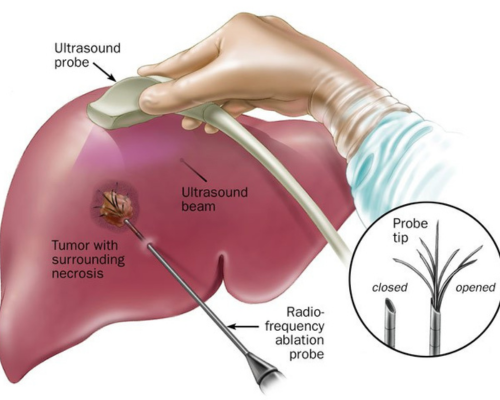Liver Tumor Ablation
What is Liver Tumor Ablation?
Liver tumor ablation is a minimally invasive treatment option used to treat tumors in the liver, including primary liver cancer (hepatocellular carcinoma) and metastases from cancers originating in other parts of the body. This procedure is designed to destroy or shrink tumors without the need for traditional surgery. It uses targeted energy to heat or freeze tumor cells, effectively removing or reducing the size of the tumor while preserving surrounding healthy tissue. Liver tumor ablation is especially beneficial for patients who are not candidates for surgery or for those with tumors that are difficult to remove.
How Liver Tumor Ablation Works:
Liver tumor ablation is performed using various techniques, all of which are guided by advanced imaging technologies such as ultrasound, CT scans, or MRI. The most common methods of liver tumor ablation are:
Radiofrequency Ablation (RFA): RFA uses high-frequency radio waves to generate heat, which is delivered directly to the tumor through a thin needle or probe. The heat destroys the cancer cells by essentially “cooking” them.
Microwave Ablation (MWA): Similar to RFA, MWA uses microwaves to generate heat, but at higher frequencies. The microwave energy heats the tumor tissue more quickly and effectively, allowing for a larger area of tissue to be treated in a shorter amount of time.
Cryoablation: This technique uses extreme cold to freeze and destroy the tumor cells. A probe is inserted directly into the tumor, where it freezes the tissue, causing the cells to rupture and die.
Irreversible Electroporation (IRE): A more recent technique that uses electrical pulses to disrupt the cell membranes of cancer cells. IRE can be particularly useful for tumors located near vital blood vessels, where other methods may be less effective.
These techniques are typically performed under local anesthesia and sedation, and they require only a small incision or needle insertion, making them much less invasive than traditional surgery.
Why Choose Liver Tumor Ablation?
- Minimally Invasive: Liver tumor ablation is performed through a small needle or catheter, which means no large incisions, less pain, and a faster recovery compared to surgery.
- Effective Treatment for Inoperable Tumors: For tumors that are too small, too numerous, or located in difficult-to-reach areas of the liver, ablation provides a safe and effective alternative to traditional surgery.
- Quick Recovery: Since the procedure is minimally invasive, most patients can return to normal activities within a few days, with minimal discomfort and no need for extended hospital stays.
- Preserves Healthy Tissue: Ablation targets the tumor directly, allowing healthy liver tissue to remain intact. This is especially important for liver function, as the liver is a vital organ.
- Can Be Used in Combination with Other Treatments: Liver tumor ablation can be used alongside other therapies like chemotherapy, surgery, or liver transplant to improve outcomes and increase the likelihood of remission.
Who is a Candidate for Liver Tumor Ablation?
Liver tumor ablation is suitable for patients who:
- Have small liver tumors: Ablation is most effective for tumors that are less than 5 cm in size. Larger tumors may require additional treatments or a combination of therapies.
- Have tumors that are not amenable to surgery: Some patients may have tumors in difficult-to-reach areas or may not be candidates for surgery due to other health conditions. Ablation offers a less invasive option for these patients.
- Are not candidates for liver transplant: For patients with primary liver cancer (HCC) or metastatic liver cancer who cannot undergo a transplant, ablation may be used to control tumor growth and improve symptoms.
- Have recurrent liver cancer: Ablation is often used for patients who have experienced a recurrence of liver cancer after previous treatments, providing a way to target new tumors that have developed.
- Need symptom relief: Ablation can help shrink tumors that are causing pain, discomfort, or pressure on other organs, improving quality of life.
What to Expect During the Procedure:
Liver tumor ablation is performed in a specialized interventional radiology suite or operating room under local anesthesia and sedation. The procedure typically takes between 30 minutes to 1.5 hours, depending on the size and location of the tumor. Here’s what you can expect:
- Preparation: You will be positioned comfortably, and the treatment area will be cleaned and numbed. A mild sedative may be administered to help you relax.
- Needle Insertion: A thin, flexible needle or catheter will be inserted into the liver, either through a small incision in the skin or through a needle puncture (in the case of a percutaneous approach). Imaging guidance (ultrasound, CT, or MRI) will be used to accurately guide the needle to the tumor.
- Ablation: Once the needle is in place, the treatment will begin. Depending on the method used (RFA, MWA, Cryoablation, or IRE), heat or cold energy will be applied to the tumor to destroy the cancer cells.
- Post-Procedure Monitoring: After the procedure, you will be monitored for a short time in the recovery room. Most patients are able to go home the same day or after a few hours of observation.
Recovery After Liver Tumor Ablation:
Liver tumor ablation typically has a quick recovery time. Most patients experience minimal pain, which can be controlled with over-the-counter pain relievers. Some may have mild discomfort in the treatment area, a low-grade fever, or nausea, but these symptoms usually resolve within a few days.
- Return to Normal Activities: Most patients can return to light activities within a few days and resume normal routines within 1-2 weeks.
- Follow-up Care: Follow-up appointments are important to monitor the effectiveness of the procedure and check for any recurrence of the tumor. Imaging tests will be used to assess the tumor’s response to the treatment.
Benefits of Liver Tumor Ablation:
- Minimally invasive with no large incisions
- Effective for small tumors or those inoperable by surgery
- Quick recovery and minimal downtime
- Preserves healthy liver tissue
- Can be repeated if necessary or combined with other treatments
- Improves symptoms and quality of life for patients with liver tumors
Is Liver Tumor Ablation Right for You?
If you have a liver tumor and are seeking an effective, less invasive treatment option, liver tumor ablation may be the solution. Our experienced vascular specialists will work with you to assess your condition and determine if this procedure is right for you.
Contact us today to schedule a consultation and learn how liver tumor ablation can help manage liver cancer, reduce tumor size, and improve your quality of life.

Our Services
- Varicose Veins
- Deep Vein Thrombosis
- Vascular Malformation
- Aortic Aneurysms
- Mesenteric Vasculature
- Acute Limb Ischemia
- Peripheral Arterial Disease
- Stroke Prevention
- Angiography
- Vascular Access for Chemotherapy
- Spider Veins
- Glue Therapy
- Sclerotherapy
- AV Fistula
- Uterine Fibroid Embolisation
- Varicocele Embolisation
- Thyroid Ablation
- TACE
- Prostatic Artery Embolisation
- Varicocele Embolisation
